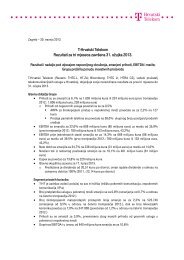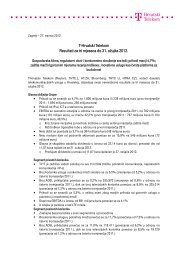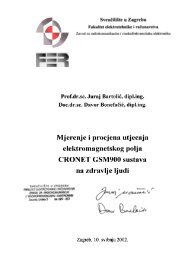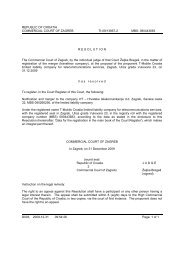Annual Report 2011 - T-Hrvatski Telekom
Annual Report 2011 - T-Hrvatski Telekom
Annual Report 2011 - T-Hrvatski Telekom
You also want an ePaper? Increase the reach of your titles
YUMPU automatically turns print PDFs into web optimized ePapers that Google loves.
88<br />
Consolidated financial statements<br />
n) Revenue recognition<br />
Revenue is recognized to the extent that it is probable<br />
that the economic benefits will flow to the Group<br />
and the revenue can be reliably measured. Revenue<br />
is measured at the fair value of the consideration<br />
received, excluding discounts, rebates, and sales taxes<br />
or duty. The Group assesses its revenue arrangements<br />
against specific criteria in order to determine if it is<br />
acting as principal or agent. The Group has concluded<br />
that it is acting as a principal in all of its revenue<br />
arrangements with the exception of the provision of<br />
its telecommunications infrastructure to third parties<br />
that offer value added services to its customer. In these<br />
cases, the Group is acting as an agent.<br />
elements based on their relative fair values (i.e., a ratio<br />
of the fair value of each element to the aggregated fair<br />
value of the bundled deliverables is generated). The<br />
relative fair value of an individual element is limited by<br />
the proportion of the total arrangement consideration<br />
to be provided by the customer, the payment of<br />
which does not depend on the delivery of additional<br />
elements. If the fair value of the delivered elements<br />
cannot be determined reliably but the fair value of<br />
the undelivered elements can be determined reliably,<br />
the total arrangement consideration provided by the<br />
customer is allocated by determining the fair value of<br />
the delivered elements as the difference between the<br />
total arrangement consideration and the fair value of<br />
the undelivered elements.<br />
Revenue from fixed telephony includes revenue from<br />
activation, monthly fees, calls placed by fixed line<br />
subscribers and revenue from additional services in<br />
fixed telephony. Revenue from activation (connection<br />
fees) is recognized on a straight-line basis throughout<br />
future periods depending on an average useful life of<br />
a single customer line. Estimated life changed from<br />
10 years in 2010 to 3 years in <strong>2011</strong>.<br />
Revenue from wholesale services includes<br />
interconnection services for domestic and<br />
international carriers.<br />
Revenue from mobile telephony includes revenue<br />
from monthly fee and call charges for “post-paid”<br />
mobile customers, call charges for “pre-paid” mobile<br />
customers, call charges for customers of international<br />
mobile operators when roaming on the Group’s<br />
mobile network, sale of mobile handsets and domestic<br />
interconnection revenues related to mobile network.<br />
Revenue from unused tariff packages and prepaid<br />
vouchers is recognized when they are realised.<br />
Before their realisation, they are recorded as deferred<br />
revenues.<br />
The Group offers certain multiple-element<br />
arrangements (bundled product offers) arrangements.<br />
For multiple-element arrangements, revenue<br />
recognition for each of the units of accounting<br />
(elements) identified must be determined separately.<br />
Total arrangement consideration relating to the<br />
bundled contract is allocated among the different<br />
Revenue from Internet and data services includes<br />
revenue from leased lines, frame relay, ATM, Ethernet<br />
services, ADSL subscription and traffic, fixed line<br />
access, WEB hosting, VPN online, internet traffic to<br />
T-Com call number, Multimedia services, IP phone<br />
(access and traffic) and IPTV. Service revenues<br />
are recognized when the services are provided in<br />
accordance with contractual terms and conditions.<br />
Revenues from the provision of its network to the<br />
provider of value added services are reported on a<br />
net basis. Revenues are exclusively the amount of the<br />
commission received.<br />
Third parties using the Group’s telecommunications<br />
network include roaming customers of other service<br />
providers and other telecommunications providers<br />
which terminate or transit calls on the Group’s<br />
network. These wholesale (incoming) traffic revenues<br />
included in Voice and Non-voice (Data and Internet)<br />
revenues are recognized in the period of related<br />
usage. A proportion of the revenue received is often<br />
paid to other operators (interconnect) for the use of<br />
their networks, where applicable. The revenues and<br />
costs of these transit calls are stated gross in the<br />
financial statements as the Group is the principal<br />
supplier of these services using its own network freely<br />
defining the pricing of the services, and recognized in<br />
the period of related usage.<br />
Revenues and expenses associated with the sale<br />
of telecommunications equipment and accessories<br />
are recognized when the products are delivered,

















